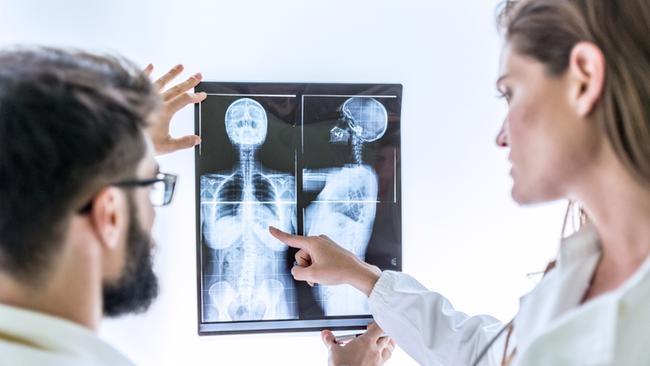Women with genetic risk for breast cancer to get precise diagnosis of cancer chance, study reveals
WOMEN who carry the most common genetic risk for breast and ovarian cancer will now get a more accurate diagnosis of their precise cancer chance.

VIC News
Don't miss out on the headlines from VIC News. Followed categories will be added to My News.
WOMEN who carry the most common genetic risk for breast and ovarian cancer, will now for the first time get a more accurate diagnosis of their precise cancer chance.
The findings from a 20-year international study, involving Melbourne researchers and patients, has revealed that family history and the location of the abnormality within the BRCA1 and BRCA2 genes strongly influence a woman’s risk.
BREAST CELL STUDY’S CANCER LINK
ALCOHOL LINK TO BREAST CANCER RELAPSE
And lifetime risk extends longer than previously believed.
The study of almost 10,000 women has produced the most accurate picture yet of the long-term breast and ovarian cancer risks for women with the gene mutations.
Study co-author and Peter MacCallum Cancer Centre Professor Kelly-Anne Phillips said the findings will change the way prevention strategies are offered to at-risk women.
“For women with a BRCA1 mutation not all of them have the same lifetime risk. We’ve needed to understand what the individual risk is to personalise those prevention strategies,” Prof Phillips said.
“Do you need risk-reducing surgery, or is your risk down the lower end where you can get away with medication? Is your breast cancer risk likely to be high in your 30s, so we need to think about doing something in your late 20s.
“Or is your risk is going to come in your 60s, so you can afford to wait longer for those prevention strategies? These are the questions this study can help address.”
The study, published today in JAMA: The Journal of the American Medical Association, found the BRCA1 mutation gives women on average a 72 per cent risk of developing breast cancer by the time she is 80, and a lifetime ovarian cancer risk of 44 per cent.
Their breast cancer risk peaks in their 30s continues until they are at least 80.
Women with BRCA2 have a 69 per cent chance of breast cancer and 17 per cent risk of ovarian cancer. Their breast cancer risk peaks in their 40s.
LUNG CANCER SCREENINGS FOR SMOKERS
The study also found there was no tail-off risk as the women aged, overturning traditional thinking that her risk decreased after age 60.
Further, a carrier who has at least one relative with breast cancer is at higher risk than someone with the same mutation, but with no family history.
Prof Phillips said they were now reanalysing the data to identify modifiable risk factors — such as alcohol consumption, contraceptive use, timing or pregnancies and hormone replacement medication — that can influence the cancer risk for these women, and produce even more tailored risk assessments.


